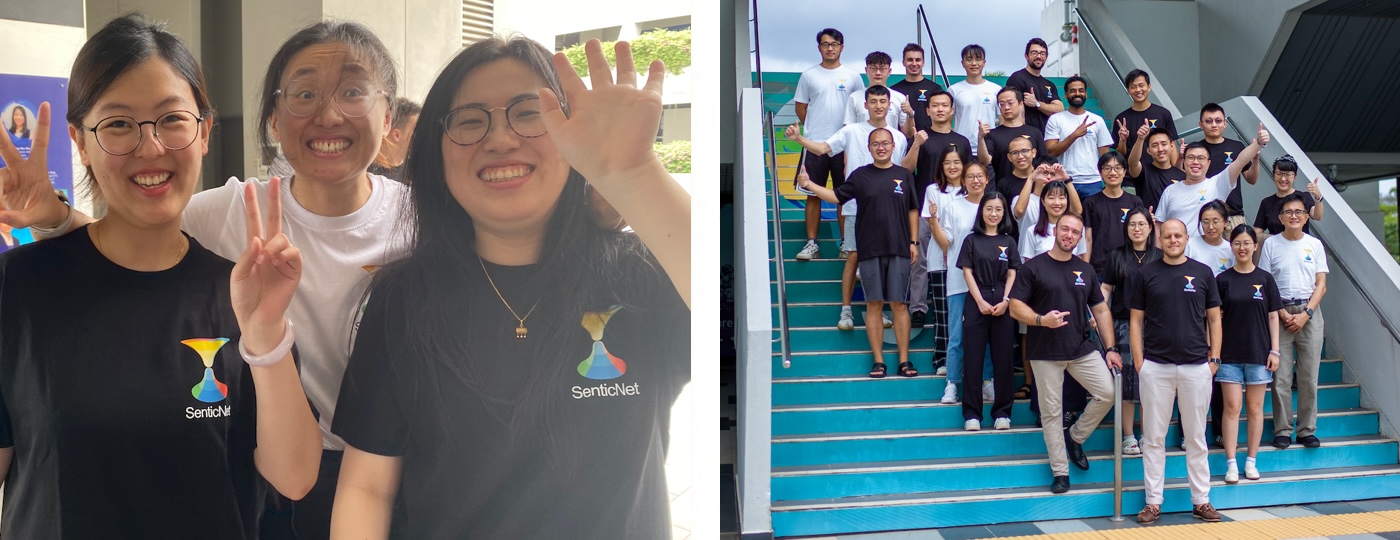Sentic Team
Sentic Team is like a jazz band: all together we play the intriguing riffs of affective computing and sentiment analysis but each of us is also playing solo the countermelodies of subjectivity detection, aspect extraction, microtext normalization, anaphora resolution, named entity recognition, sarcasm detection, and many more. The team is located at the Computational Intelligence Lab (CIL) in the College of Computing and Data Science (CCDS) of Nanyang Technological University (NTU).
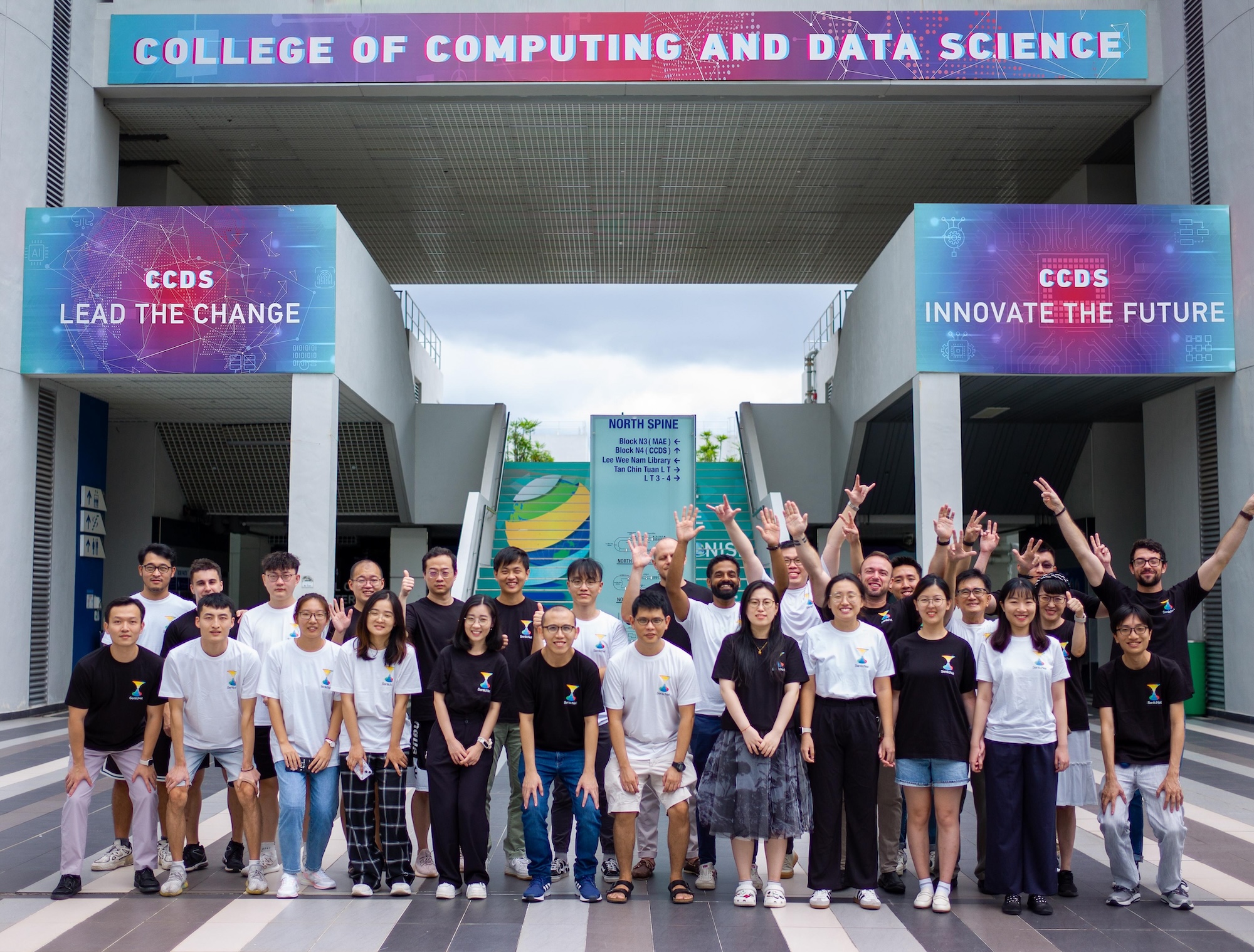
The team consists of a couple of postdocs and a dozen PhD students, plus several research students, interns, part-time researchers, and visiting collaborators. Each team member is contactable via email at first-name@sentic.net. For general info about SenticNet, you can write to info@sentic.net. If interested in using SenticNet for your company, please visit our corporate website or contact us at business@sentic.net.
ERIK CAMBRIA
 Erik Cambria is a Professor at Nanyang Technological University, where he also holds the appointment of Provost Chair in Computer Science and Engineering, and Founder of several AI companies, such as SenticNet, offering B2B sentiment analysis services, and finaXai, providing fully explainable financial insights. Prior to moving to Singapore, he worked at Microsoft Research Asia (Beijing) and HP Labs India (Bangalore), after earning his PhD through a joint program between the University of Stirling and MIT Media Lab. His research focuses on neurosymbolic AI for interpretable, trustworthy, and explainable affective computing in domains like social media monitoring, financial forecasting, and AI for social good. He is ranked in Clarivate's List of World's Top 1% Scientists, is recipient of many awards, e.g., IEEE Outstanding Early Career, was listed among the AI's 10 to Watch, and was featured in Forbes as one of the People Building Our AI Future. He is an IEEE Fellow, Associate Editor of various top-tier AI journals, e.g., Information Fusion and IEEE Trans on Affective Computing, and is involved in several international conferences as keynote speaker, program chair and committee member. When he is not busy answering emails, Erik likes cooking, retrogaming, motorcycling, and snowboarding.
Erik Cambria is a Professor at Nanyang Technological University, where he also holds the appointment of Provost Chair in Computer Science and Engineering, and Founder of several AI companies, such as SenticNet, offering B2B sentiment analysis services, and finaXai, providing fully explainable financial insights. Prior to moving to Singapore, he worked at Microsoft Research Asia (Beijing) and HP Labs India (Bangalore), after earning his PhD through a joint program between the University of Stirling and MIT Media Lab. His research focuses on neurosymbolic AI for interpretable, trustworthy, and explainable affective computing in domains like social media monitoring, financial forecasting, and AI for social good. He is ranked in Clarivate's List of World's Top 1% Scientists, is recipient of many awards, e.g., IEEE Outstanding Early Career, was listed among the AI's 10 to Watch, and was featured in Forbes as one of the People Building Our AI Future. He is an IEEE Fellow, Associate Editor of various top-tier AI journals, e.g., Information Fusion and IEEE Trans on Affective Computing, and is involved in several international conferences as keynote speaker, program chair and committee member. When he is not busy answering emails, Erik likes cooking, retrogaming, motorcycling, and snowboarding.
RUI MAO
 Rui Mao is currently a research fellow at NTU CCDS under the supervision of Erik Cambria. He obtained his PhD in Computing Science from the University of Aberdeen, UK in 2020. During the final months of his PhD, he was also a research scientist intern at Amazon, working on sentiment analysis and business benchmarking. Before becoming a researcher in Computing Science, Rui was a strategy manager in Hodo Group, engaging in strategy management and doing consultancy from 2011 to 2014. Rui received his MSc (distinction) in Business Analytics from the University of Surrey, UK in 2016 and BSc in Business Administration from Nanjing College for Population Program Management in 2011. His current research focus lies at the intersection between dialogue systems and metaphorical cognition. Apart from NLP research, Rui also likes to play guitar and cooking.
Rui Mao is currently a research fellow at NTU CCDS under the supervision of Erik Cambria. He obtained his PhD in Computing Science from the University of Aberdeen, UK in 2020. During the final months of his PhD, he was also a research scientist intern at Amazon, working on sentiment analysis and business benchmarking. Before becoming a researcher in Computing Science, Rui was a strategy manager in Hodo Group, engaging in strategy management and doing consultancy from 2011 to 2014. Rui received his MSc (distinction) in Business Analytics from the University of Surrey, UK in 2016 and BSc in Business Administration from Nanjing College for Population Program Management in 2011. His current research focus lies at the intersection between dialogue systems and metaphorical cognition. Apart from NLP research, Rui also likes to play guitar and cooking.
XULANG ZHANG
 Xulang Zhang received her PhD in Computer Science and Engineering from NTU CCDS in 2024 under the co-supervision of Prof Erik Cambria and Dr Rui Mao. She is currently a reseach fellow in the Sentic Team, where she carries out research on affective computing, sentiment analysis, and NLP. In particular, she is focusing on the application of multitask learning to granular syntactic processing, e.g., for POS tagging, text chunking, lemmatization, and sentence boundary disambiguation, in support of several downstream NLP tasks. In addition, she is interested in integrating such syntactic processing techniques to more advanced semantic tasks such as concept extraction, aspect extraction and polarity detection. In her free time, Xulang likes yoga, fictions, and is a binge reader.
Xulang Zhang received her PhD in Computer Science and Engineering from NTU CCDS in 2024 under the co-supervision of Prof Erik Cambria and Dr Rui Mao. She is currently a reseach fellow in the Sentic Team, where she carries out research on affective computing, sentiment analysis, and NLP. In particular, she is focusing on the application of multitask learning to granular syntactic processing, e.g., for POS tagging, text chunking, lemmatization, and sentence boundary disambiguation, in support of several downstream NLP tasks. In addition, she is interested in integrating such syntactic processing techniques to more advanced semantic tasks such as concept extraction, aspect extraction and polarity detection. In her free time, Xulang likes yoga, fictions, and is a binge reader.
QIAN LIU
 Qian Liu received her PhD degree in Computer Science from Beijing Institute of Technology (China) in 2020. During this period, she also pursued the Dual-PhD degree in Software Engineering from University of Technology Sydney (Australia). During the final months of her PhD, she was a research intern at Microsoft working on machine reading comprehension and knowledge-based information retrieval. Subsequently, Qian decided to continue her research in the Sentic Team as a postdoc working on commonsense knowledge representation and reasoning, transfer learning and implicit question answering. In her free time, Qian likes swimming, jogging, and traveling.
Qian Liu received her PhD degree in Computer Science from Beijing Institute of Technology (China) in 2020. During this period, she also pursued the Dual-PhD degree in Software Engineering from University of Technology Sydney (Australia). During the final months of her PhD, she was a research intern at Microsoft working on machine reading comprehension and knowledge-based information retrieval. Subsequently, Qian decided to continue her research in the Sentic Team as a postdoc working on commonsense knowledge representation and reasoning, transfer learning and implicit question answering. In her free time, Qian likes swimming, jogging, and traveling.
SOOJI HAN
 Sooji Han is a research fellow in the Sentic Team. She obtained her PhD degree in Computer Science from the University of Sheffield (UK) in 2020. Her doctoral research focused on the characterisation of rumours and their spreading on social media and rumour detection in the early stages of the diffusion of real-world events. Sooji worked with the UK's Defence Science and Technology Laboratory (Dstl) as a research associate at the University of Sheffield before joining the Sentic Team. Her research interests lie in the scientific understanding and modelling of human cognition and behaviour via natural language processing and real-world applications of human-centred artificial intelligence such as explainable depression detection. In her spare time, she likes learning languages, going to cafés and the gym, and travelling.
Sooji Han is a research fellow in the Sentic Team. She obtained her PhD degree in Computer Science from the University of Sheffield (UK) in 2020. Her doctoral research focused on the characterisation of rumours and their spreading on social media and rumour detection in the early stages of the diffusion of real-world events. Sooji worked with the UK's Defence Science and Technology Laboratory (Dstl) as a research associate at the University of Sheffield before joining the Sentic Team. Her research interests lie in the scientific understanding and modelling of human cognition and behaviour via natural language processing and real-world applications of human-centred artificial intelligence such as explainable depression detection. In her spare time, she likes learning languages, going to cafés and the gym, and travelling.
DEEKSHA VARSHNEY
 Deeksha Varshney received her PhD from the Indian Institute of Technology Patna, India in December 2023. During her PhD, she worked mainly in Conversational AI. She primarily focused on knowledge-based dialogue generation using various NLP techniques. She has developed dialogue systems leveraging structured and unstructured knowledge in open-domain and task-oriented settings. She has also created datasets and conversation models that have proven advantageous in the healthcare industry. She is currently a research fellow in the Sentic Team, where she spearheads research initiatives focused on utilizing affective computing techniques to gather public opinions regarding climate change. In her free time, she likes to do gardening.
Deeksha Varshney received her PhD from the Indian Institute of Technology Patna, India in December 2023. During her PhD, she worked mainly in Conversational AI. She primarily focused on knowledge-based dialogue generation using various NLP techniques. She has developed dialogue systems leveraging structured and unstructured knowledge in open-domain and task-oriented settings. She has also created datasets and conversation models that have proven advantageous in the healthcare industry. She is currently a research fellow in the Sentic Team, where she spearheads research initiatives focused on utilizing affective computing techniques to gather public opinions regarding climate change. In her free time, she likes to do gardening.
SENG-BENG HO
 Seng-Beng Ho is a Honorary Member of the Sentic Team and the CEO of AI Institute Global, which conducts research and courses in AI. He has a PhD in Cognitive Science from the University of Wisconsin, Madison, USA. From 1998 to 2008, he was Founder and President of E-Book Systems, a company that developed and marketed a novel 3D page-flipping interface for electronic books, with offices in Silicon Valley, Beijing, Tokyo, Germany, and Singapore. He holds 36 US and world-wide patents related to e-book technology. Until 2024, he was the Deputy Director of the Department of Social and Cognitive Computing at A*STAR Institute of High Performance Computing. His current research interests include noology, natural language understanding, causal learning, functional understanding, and computational models of motivation and emotion. In his free time, Seng-Beng enjoys reading, Chinese poetry-writing, movie-going, and building super-scale Lego and Meccano models.
Seng-Beng Ho is a Honorary Member of the Sentic Team and the CEO of AI Institute Global, which conducts research and courses in AI. He has a PhD in Cognitive Science from the University of Wisconsin, Madison, USA. From 1998 to 2008, he was Founder and President of E-Book Systems, a company that developed and marketed a novel 3D page-flipping interface for electronic books, with offices in Silicon Valley, Beijing, Tokyo, Germany, and Singapore. He holds 36 US and world-wide patents related to e-book technology. Until 2024, he was the Deputy Director of the Department of Social and Cognitive Computing at A*STAR Institute of High Performance Computing. His current research interests include noology, natural language understanding, causal learning, functional understanding, and computational models of motivation and emotion. In his free time, Seng-Beng enjoys reading, Chinese poetry-writing, movie-going, and building super-scale Lego and Meccano models.
VLAD PANDELEA
 Vlad Pandelea received his Bachelor and Master of Science in Computer Science from the University of Pisa in 2017 and 2019, respectively. He was one of the very first students to get a Master degree with focus on AI in Italy. Since 2020, he is a PhD student at NTU CCDS under the supervision of Erik Cambria. His research interest is in natural language processing, mainly dialogue systems and sentiment analysis. Currently, he is working on methods to efficiently deploy competitive solutions on resource-constrained devices. He is interested in both deep learning techniques that focus on improving performance and on more efficient methods such as randomized neural networks that aim to reduce computational requirements. Vlad's most representative work is his paper on dialogue systems with audio context. In his spare time, he likes working out at the gym, swimming and playing poker.
Vlad Pandelea received his Bachelor and Master of Science in Computer Science from the University of Pisa in 2017 and 2019, respectively. He was one of the very first students to get a Master degree with focus on AI in Italy. Since 2020, he is a PhD student at NTU CCDS under the supervision of Erik Cambria. His research interest is in natural language processing, mainly dialogue systems and sentiment analysis. Currently, he is working on methods to efficiently deploy competitive solutions on resource-constrained devices. He is interested in both deep learning techniques that focus on improving performance and on more efficient methods such as randomized neural networks that aim to reduce computational requirements. Vlad's most representative work is his paper on dialogue systems with audio context. In his spare time, he likes working out at the gym, swimming and playing poker.
WEI LI
 Wei Li received his Bachelor of Industrial Engineering from Shanghai Jiao Tong University in 2015. After that, he obtained his Master of Management Science and Engineering from University of Chinese Academy of Sciences in 2018. After joining the Sentic Team as an intern funded by the China Scholarship Council, he enrolled as a PhD student under the supervision of Erik Cambria at NTU CCDS. His main research interests include sentiment analysis, natural language processing and deep learning. In particular, he is working on the construction of advanced deep learning models for sentiment analysis. Additionally, he is also interested in question answering systems. Wei's most representative work is his paper on conversational sentiment analysis. When he is not busy with scientific research, Wei spends his time watching movies, reading historical books and playing snooker.
Wei Li received his Bachelor of Industrial Engineering from Shanghai Jiao Tong University in 2015. After that, he obtained his Master of Management Science and Engineering from University of Chinese Academy of Sciences in 2018. After joining the Sentic Team as an intern funded by the China Scholarship Council, he enrolled as a PhD student under the supervision of Erik Cambria at NTU CCDS. His main research interests include sentiment analysis, natural language processing and deep learning. In particular, he is working on the construction of advanced deep learning models for sentiment analysis. Additionally, he is also interested in question answering systems. Wei's most representative work is his paper on conversational sentiment analysis. When he is not busy with scientific research, Wei spends his time watching movies, reading historical books and playing snooker.
LUYAO ZHU
 Luyao Zhu received her Bachelor of Science in Mathematics and Applied Mathematics and Bachelor of Science in Economics from China University of Political Science and Law, in 2016. Subsequently, she went on to pursue a Master of Science in Management Science and Engineering at University of Chinese Academy of Sciences, in 2019. After joining the Sentic Team as an intern funded by the China Scholarship Council, she is currently a PhD student under the supervision of Erik Cambria at NTU CCDS. Her research interests include natural language understanding, sentiment analysis, and deep reinforcement learning, which she applies to the development of persona-specific dialogue systems. Luyao's most representative paper is her work on lexicon-integrated CNN–LSTM for sentiment analysis. In her spare time, Luyao immerses herself in painting and cooking.
Luyao Zhu received her Bachelor of Science in Mathematics and Applied Mathematics and Bachelor of Science in Economics from China University of Political Science and Law, in 2016. Subsequently, she went on to pursue a Master of Science in Management Science and Engineering at University of Chinese Academy of Sciences, in 2019. After joining the Sentic Team as an intern funded by the China Scholarship Council, she is currently a PhD student under the supervision of Erik Cambria at NTU CCDS. Her research interests include natural language understanding, sentiment analysis, and deep reinforcement learning, which she applies to the development of persona-specific dialogue systems. Luyao's most representative paper is her work on lexicon-integrated CNN–LSTM for sentiment analysis. In her spare time, Luyao immerses herself in painting and cooking.
JINJIE NI
 Jinjie Ni received his bachelor's degree in Intelligence Science and Technology from Northwestern Polytechnical University in 2020. Upon graduation, he worked as an intern in the Bio-inspired-intelligence Research for Artificial Vision and lEarning (BRAVE) at the Institute of Automation, Chinese Academy of Sciences. He is currently pursuing a PhD degree under the supervision of Erik Cambria at NTU CCDS. He devotes his research efforts mainly to goal-oriented dialogue systems based on multi-hierarchy learning but he is also interested in many other research topics, including sentiment analysis, pattern recognition, text understanding, generative adversarial networks and graph networks. In his leisure time, Jinjie loves playing basketball, working out at the gym, and traveling.
Jinjie Ni received his bachelor's degree in Intelligence Science and Technology from Northwestern Polytechnical University in 2020. Upon graduation, he worked as an intern in the Bio-inspired-intelligence Research for Artificial Vision and lEarning (BRAVE) at the Institute of Automation, Chinese Academy of Sciences. He is currently pursuing a PhD degree under the supervision of Erik Cambria at NTU CCDS. He devotes his research efforts mainly to goal-oriented dialogue systems based on multi-hierarchy learning but he is also interested in many other research topics, including sentiment analysis, pattern recognition, text understanding, generative adversarial networks and graph networks. In his leisure time, Jinjie loves playing basketball, working out at the gym, and traveling.
MENGSHI GE
 Mengshi Ge received her Bachelor of Science in Mathematics and Applied Mathematics from Dalian University of Technology (China) in 2017. She later moved on to get a Master of Science in Statistics at George Washington University (USA) in 2019. She is currently a part-time PhD student at NTU CCDS under the tutelage of Profs Erik Cambria and Nadia Thalamann from NTU IMI, where she applied a mixture of knoweldge representation algorithms and latest deep learning techniques to improve the communication skills of Nadine, NTU's female humanoid social robot. Currently, she is developing a explainable metaphor identification model, inspired by Conceptual Metaphor Theory. In her spare time, Mengshi likes to watch musicals, watercolor journaling and jogging.
Mengshi Ge received her Bachelor of Science in Mathematics and Applied Mathematics from Dalian University of Technology (China) in 2017. She later moved on to get a Master of Science in Statistics at George Washington University (USA) in 2019. She is currently a part-time PhD student at NTU CCDS under the tutelage of Profs Erik Cambria and Nadia Thalamann from NTU IMI, where she applied a mixture of knoweldge representation algorithms and latest deep learning techniques to improve the communication skills of Nadine, NTU's female humanoid social robot. Currently, she is developing a explainable metaphor identification model, inspired by Conceptual Metaphor Theory. In her spare time, Mengshi likes to watch musicals, watercolor journaling and jogging.
RUICHENG LIU
 Ruicheng Liu got his Bachelor of Engineering in Computer Science from NTU. After graduating, he worked as a Project Officer in NTU School of Physical and Mathematical Sciences. His research experience includes applying deep learning techniques in systemic risk prediction and applying graph neural networks on market risk management. Since 2020, he is pursuing a part-time PhD at CCDS under Prof Erik Cambria. His PhD work gravitates around fundamental issues of sentiment analysis research, e.g., coreference resolution, and its application to real-world problems, especially those related to fintech and natural language based financial forecasting. When he is not busy studying and researching about AI, Ruicheng likes to play basketball, going to the gym and swimming.
Ruicheng Liu got his Bachelor of Engineering in Computer Science from NTU. After graduating, he worked as a Project Officer in NTU School of Physical and Mathematical Sciences. His research experience includes applying deep learning techniques in systemic risk prediction and applying graph neural networks on market risk management. Since 2020, he is pursuing a part-time PhD at CCDS under Prof Erik Cambria. His PhD work gravitates around fundamental issues of sentiment analysis research, e.g., coreference resolution, and its application to real-world problems, especially those related to fintech and natural language based financial forecasting. When he is not busy studying and researching about AI, Ruicheng likes to play basketball, going to the gym and swimming.
KELVIN DU
 Kelvin Du has been working in data analytics field for more than seven years from business intelligence, advanced analytics, machine learning to deep learning in different government-linked companies (GLCs) in Singapore. His main research interest is financial sentiment analysis. Kelvin received his master's degree in Computing from the National University of Singapore, master's degree in Analytics from the Singapore Management University and bachelor's degree in Mathematics and Applied Mathematics from the Nanjing University of Technology, China. Currently he is pursuing his part-time PhD study at NTU CCDS under the supervision of Prof Erik Cambria. In his free time, Kelvin enjoys listening to music, reading and jogging.
Kelvin Du has been working in data analytics field for more than seven years from business intelligence, advanced analytics, machine learning to deep learning in different government-linked companies (GLCs) in Singapore. His main research interest is financial sentiment analysis. Kelvin received his master's degree in Computing from the National University of Singapore, master's degree in Analytics from the Singapore Management University and bachelor's degree in Mathematics and Applied Mathematics from the Nanjing University of Technology, China. Currently he is pursuing his part-time PhD study at NTU CCDS under the supervision of Prof Erik Cambria. In his free time, Kelvin enjoys listening to music, reading and jogging.
CUC DUONG
 Cuc Duong is a PhD student of the Interdisciplinary Graduate Program under the supervision of Prof Erik Cambria. She is from a small village near Hoi An Ancient Town, a unique tourism place growingly popular in Vietnam. In 2012, she was awarded the Intel Vietnam Study Abroad scholarship to study at Portland State University, where she graduated with a bachelor's degree in Electrical Engineer two years later. After graduation, she worked at Intel Products Vietnam for three years and then moved to Singapore to do research work in the context of sentiment analysis and environmental applications such as AI for climate change. She enjoys walking outside, cycling, and chatting with friends. During the weekend, she cooks and sometimes goes swimming.
Cuc Duong is a PhD student of the Interdisciplinary Graduate Program under the supervision of Prof Erik Cambria. She is from a small village near Hoi An Ancient Town, a unique tourism place growingly popular in Vietnam. In 2012, she was awarded the Intel Vietnam Study Abroad scholarship to study at Portland State University, where she graduated with a bachelor's degree in Electrical Engineer two years later. After graduation, she worked at Intel Products Vietnam for three years and then moved to Singapore to do research work in the context of sentiment analysis and environmental applications such as AI for climate change. She enjoys walking outside, cycling, and chatting with friends. During the weekend, she cooks and sometimes goes swimming.
ZONGLIN YANG
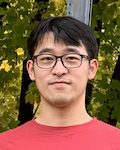 Zonglin Yang received his Bachelor's degree in Electronic Information Engineering from Huazhong University of Science and Technology, and a Master's degree in Computer Science from Cornell University. After that, he joined the Sentic Team as a PhD student under the supervision of Prof Erik Cambria. He is generally interested in developing deep learning systems that can utilize or 'reason' over (commonsense) knowledge to provide more informative and intelligent solutions such as using language models as inductive reasoners. This general research goal needs to integrate methods from various directions of AI. In his spare time, Zonglin likes playing basketball, jogging, and reading.
Zonglin Yang received his Bachelor's degree in Electronic Information Engineering from Huazhong University of Science and Technology, and a Master's degree in Computer Science from Cornell University. After that, he joined the Sentic Team as a PhD student under the supervision of Prof Erik Cambria. He is generally interested in developing deep learning systems that can utilize or 'reason' over (commonsense) knowledge to provide more informative and intelligent solutions such as using language models as inductive reasoners. This general research goal needs to integrate methods from various directions of AI. In his spare time, Zonglin likes playing basketball, jogging, and reading.
RAN ZHOU
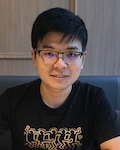 Ran Zhou received his Bachelor of Engineering degree from NTU in 2017. Currently he is a PhD student under the co-supervision of Prof Erik Cambria within the Alibaba-NTU Industrial Postgraduate Program, a new program that seeks to equip postgraduate students with critical R&D skill-sets through practical work experience on projects with a multinational company in Singapore. His main research interests are in the areas of natural language processing, sentiment analysis and domain adaptation. In particular, his PhD research efforts are currently oriented towards cross-lingual named entity recognition, a fundamental subtask of sentiment analysis, especially in the context of market research. During his free time, Ran enjoys jogging, model building and karaoke.
Ran Zhou received his Bachelor of Engineering degree from NTU in 2017. Currently he is a PhD student under the co-supervision of Prof Erik Cambria within the Alibaba-NTU Industrial Postgraduate Program, a new program that seeks to equip postgraduate students with critical R&D skill-sets through practical work experience on projects with a multinational company in Singapore. His main research interests are in the areas of natural language processing, sentiment analysis and domain adaptation. In particular, his PhD research efforts are currently oriented towards cross-lingual named entity recognition, a fundamental subtask of sentiment analysis, especially in the context of market research. During his free time, Ran enjoys jogging, model building and karaoke.
SIDNEY SUEN
 Sidney Suen received his Bachelor of Engineering in Information Systems Technology and Design from Singapore University of Technology and Design in 2018. He later worked in A*STAR for 2 years as a research engineer before being awarded the A*STAR Computing and Information Science (ACIS) scholarship. He will be pursuing a full time PhD at NTU CCDS under the tutelage of Prof Erik Cambria and Dr Kenneth Kwok from Institute of High Performance Computing (IHPC). His research interests include knowledge representation and reasoning and integrating common-sense into AI systems. He aims to develop knowledge bases that exposes the subtle aspects of human interaction such as cultural norms. In his free time, Sidney likes watching anime, lifting weights, and taking longs walks to the beach.
Sidney Suen received his Bachelor of Engineering in Information Systems Technology and Design from Singapore University of Technology and Design in 2018. He later worked in A*STAR for 2 years as a research engineer before being awarded the A*STAR Computing and Information Science (ACIS) scholarship. He will be pursuing a full time PhD at NTU CCDS under the tutelage of Prof Erik Cambria and Dr Kenneth Kwok from Institute of High Performance Computing (IHPC). His research interests include knowledge representation and reasoning and integrating common-sense into AI systems. He aims to develop knowledge bases that exposes the subtle aspects of human interaction such as cultural norms. In his free time, Sidney likes watching anime, lifting weights, and taking longs walks to the beach.
YAN LIU
 Yan Liu received her Bachelor of Electrical and Electronics Engineering from Nanyang Technological University (NTU) in 2020. After graduation, she joined A*STAR and worked as a research engineer for 2 years. Her research work is related to knowledge representation and reasoning for NLP applications such as knowledge-based question answering and dialogue systems. She is pursuing a PhD degree under the supervision of Erik Cambria at NTU School of Computer Science and Engineering (CCDS) and Seng-Beng Ho at A*STAR Institute of High Performance Computing (IHPC). Her main research interests are neurosymbolic AI, knowledge-based sentiment analysis and natural language understanding. In her free time, she likes karaoke, reading and jogging.
Yan Liu received her Bachelor of Electrical and Electronics Engineering from Nanyang Technological University (NTU) in 2020. After graduation, she joined A*STAR and worked as a research engineer for 2 years. Her research work is related to knowledge representation and reasoning for NLP applications such as knowledge-based question answering and dialogue systems. She is pursuing a PhD degree under the supervision of Erik Cambria at NTU School of Computer Science and Engineering (CCDS) and Seng-Beng Ho at A*STAR Institute of High Performance Computing (IHPC). Her main research interests are neurosymbolic AI, knowledge-based sentiment analysis and natural language understanding. In her free time, she likes karaoke, reading and jogging.
WEIJIE YEO
 Weijie Yeo received his Bachelor in Mechanical Engineering in 2020. He worked for a year and a half in a semiconductor company, where he developed an interest in AI and did some form of self-study before starting his PhD at NTU School of Computer Science and Engineering under the supervision of Erik Cambria. Weijie started his research in the field of deep reinforcement learning before gaining an interest in NLP applications. His current research goals are utilizing sentiment analysis as a representation in reinforcement learning for downstream finance applications such as portfolio allocation. In his free time, Weijie usually works out in the gym or spends his time watching films.
Weijie Yeo received his Bachelor in Mechanical Engineering in 2020. He worked for a year and a half in a semiconductor company, where he developed an interest in AI and did some form of self-study before starting his PhD at NTU School of Computer Science and Engineering under the supervision of Erik Cambria. Weijie started his research in the field of deep reinforcement learning before gaining an interest in NLP applications. His current research goals are utilizing sentiment analysis as a representation in reinforcement learning for downstream finance applications such as portfolio allocation. In his free time, Weijie usually works out in the gym or spends his time watching films.
WEILIANG SEOW
 Weiliang Seow received his Bachelor Degree in Materials Science and Engineering from NTU in 2015. After graduation, he was an engineer in the semiconductor and manufacturing industry for 5 years. In 2020, he took a Venture Building Programme under NUS Enterprise. Upon graduating from the programme, he co-founded a startup named Docuf.AI, which performs intelligent data extraction from documents (e.g., invoices, purchase order, packing list) using AI. Today, he is also a part-time PhD student at CCDS under the supervision of Prof Erik Cambria. His main research interests are in the fields of named entity recognition and natural language processing. During his free time, he likes to go jogging and try out nice food.
Weiliang Seow received his Bachelor Degree in Materials Science and Engineering from NTU in 2015. After graduation, he was an engineer in the semiconductor and manufacturing industry for 5 years. In 2020, he took a Venture Building Programme under NUS Enterprise. Upon graduating from the programme, he co-founded a startup named Docuf.AI, which performs intelligent data extraction from documents (e.g., invoices, purchase order, packing list) using AI. Today, he is also a part-time PhD student at CCDS under the supervision of Prof Erik Cambria. His main research interests are in the fields of named entity recognition and natural language processing. During his free time, he likes to go jogging and try out nice food.
WIHAN VAN DER HEEVER
 Wihan obtained his Masters of Commerce in Advanced Data Analytics at the University of Pretoria in South Africa. Concurrent with this, he worked as a data scientist for G3 Business Solutions, a SME focused on stakeholder engagement strategy, research, training, governance and reporting. He came under the supervision of Prof Erik Cambria and joined the Sentic Team at the end of 2022, as a PhD student at NTU CCDS. From mixture models to NLP, Wihan's research interest lies in using statistical and machine learning knowledge to bridge the gap of the current understanding of AI so as to obtain explainable financial forecasting. In his spare time, you might find him reading about philosophy or psychology, hiking to some obscure viewpoint or building his brand via the arts.
Wihan obtained his Masters of Commerce in Advanced Data Analytics at the University of Pretoria in South Africa. Concurrent with this, he worked as a data scientist for G3 Business Solutions, a SME focused on stakeholder engagement strategy, research, training, governance and reporting. He came under the supervision of Prof Erik Cambria and joined the Sentic Team at the end of 2022, as a PhD student at NTU CCDS. From mixture models to NLP, Wihan's research interest lies in using statistical and machine learning knowledge to bridge the gap of the current understanding of AI so as to obtain explainable financial forecasting. In his spare time, you might find him reading about philosophy or psychology, hiking to some obscure viewpoint or building his brand via the arts.
JAYANT TEOTIA
 Jayant completed his Bachelors’ in mechanical engineering from India Institute of Technology Roorkee. There, as part of a collegiate group, he was Controls Engineer at IITRMS where his team designed an electric F1-styled race car. He was also the official race driver at Formula Bharat competition. Today, Jayant is a PhD student at NTU CCDS under the supervision of Prof Erik Cambria working on multimodal fusion and generalization. Before that, he was a Project Associate at IISc Bangalore, working on object detection and segmentation for three years. His current research focuses on open-vocabulary segmentation using vision language models. In his free time, he enjoys reading, music and playing badminton.
Jayant completed his Bachelors’ in mechanical engineering from India Institute of Technology Roorkee. There, as part of a collegiate group, he was Controls Engineer at IITRMS where his team designed an electric F1-styled race car. He was also the official race driver at Formula Bharat competition. Today, Jayant is a PhD student at NTU CCDS under the supervision of Prof Erik Cambria working on multimodal fusion and generalization. Before that, he was a Project Associate at IISc Bangalore, working on object detection and segmentation for three years. His current research focuses on open-vocabulary segmentation using vision language models. In his free time, he enjoys reading, music and playing badminton.
KEANE ONG
 Keane Ong received his Bachelor in Mechanical Engineering from NUS in 2023. During his undergraduate years, he developed a keen interest in Fintech and AI, completing several projects related to NLP and financial forecasting. Today, he is a PhD student at the NUS Asian Institute of Digital Finance under the Digital Fintech programme co-supervised by Prof Gianmarco Mengaldo from NUS and Prof Erik Cambria from NTU. Keane's current research interests are explainable NLP and explainable finance. In his free time, he likes to play soccer, hike and travel.
Keane Ong received his Bachelor in Mechanical Engineering from NUS in 2023. During his undergraduate years, he developed a keen interest in Fintech and AI, completing several projects related to NLP and financial forecasting. Today, he is a PhD student at the NUS Asian Institute of Digital Finance under the Digital Fintech programme co-supervised by Prof Gianmarco Mengaldo from NUS and Prof Erik Cambria from NTU. Keane's current research interests are explainable NLP and explainable finance. In his free time, he likes to play soccer, hike and travel.
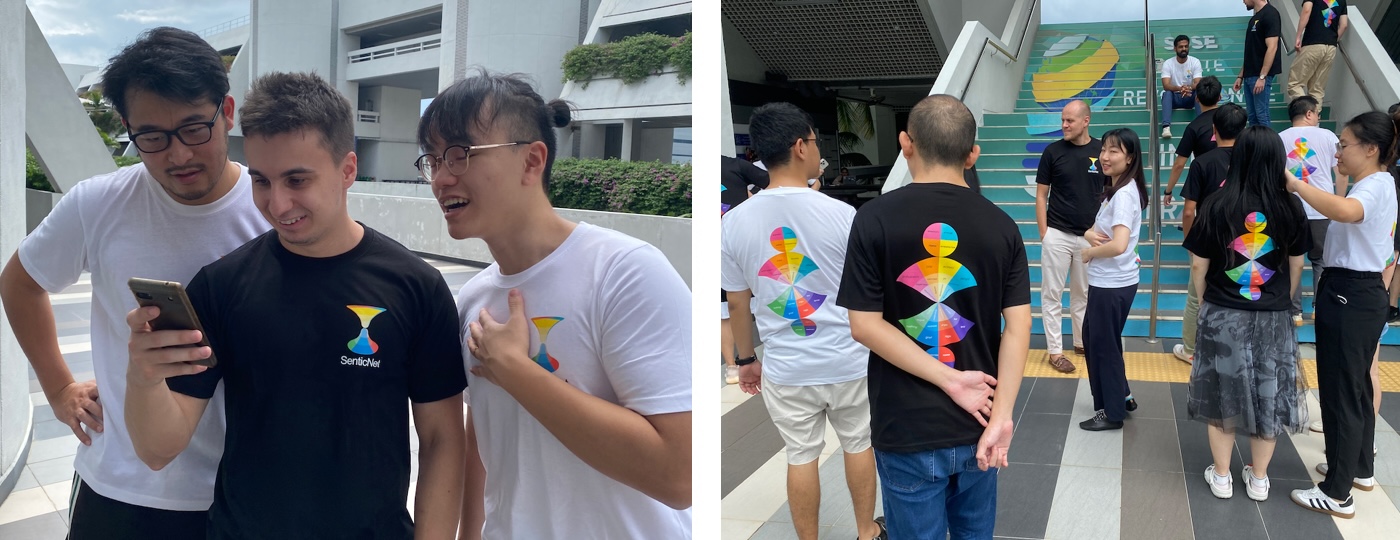
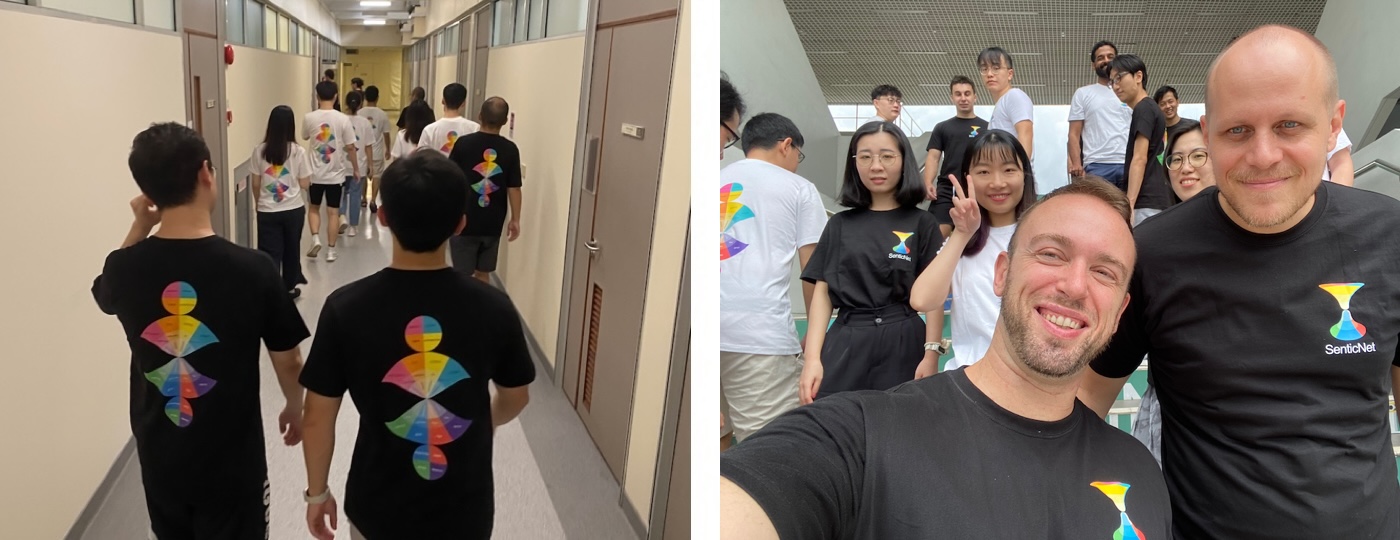
SENTIC TEAM GRADUATES
2025, PhD, Cuc Duong
2024, PhD, Xulang Zhang
2024, PhD, Vlad Pandelea
2024, PhD, Ran Zhou
2023, PhD, Jinjie Ni
2023, PhD, Wei Li
2023, PhD, Tom Young
2022, PhD, Qian Chen
2022, PhD, Yosephine Susanto
2021, PhD, Ranjan Satapathy
2020, PhD, Xiaoshi Zhong
2020, PhD, Soujanya Poria
2019, MPhil, Ikhlas Al-hussien
2019, PhD, Haiyun Peng
2018, MPhil, Simone Merello
2018, MPhil, Andrea Picasso
2018, PhD, Sandro Cavallari
2018, PhD, Frank Xing
2018, PhD, Yukun Ma
2017, PhD, Ha-Nguyen Tran

VISITING PROFESSORS
Bebo White (Stanford, USA)
Hiroaki Kitano (Sony Computer Science Laboratories, Japan)
Andrew Ortony (Northwestern University, USA)
Mike Thelwall (University of Wolverhampton, UK)
Newton Howard (MIT Media Lab, USA)
Amit Sheth (Kno.e.sis, USA)
Andre Possani Espinosa (ITAM, Mexico)
Stefano Squartini (Marche Polytechnic University, Italy)
Andrés Gómez de Silva Garza (ITAM, Mexico)
Luca Oneto (University of Genoa, Italy)
Alexander Gelbukh (Instituto Politécnico Nacional, Mexico)

JOINING THE TEAM
If you plan to join the Sentic Team, please beware that the way we work is rather unconventional. Like in a jazz band, there are no music sheets and there is no maestro. We'll show you the contour of the tunes we play, but then it's up to you to decide which instrument to pick, what to play, and who to sync with. In other words, we will not tell you what to do, instead we will help you boost your creativity and, ultimately, just express yourself and your ideas.
If you are willing to join us for a short period, consider enrolling in one of NTU global programmes. If you want to join us for a longer period, please apply for PhD at NTU. A good number of scholarships is also available, e.g., SINGA. Finally, if you want to become part of our research staff, you can enquire about vacancies but please note that, for staff hiring, we will be mostly looking at your publication/citation profile so, if you have few/none, we suggest you to consider applying for PhD instead. For postdoc positions, in particular, please note that we will only consider candidates with a 2-digit H-index.
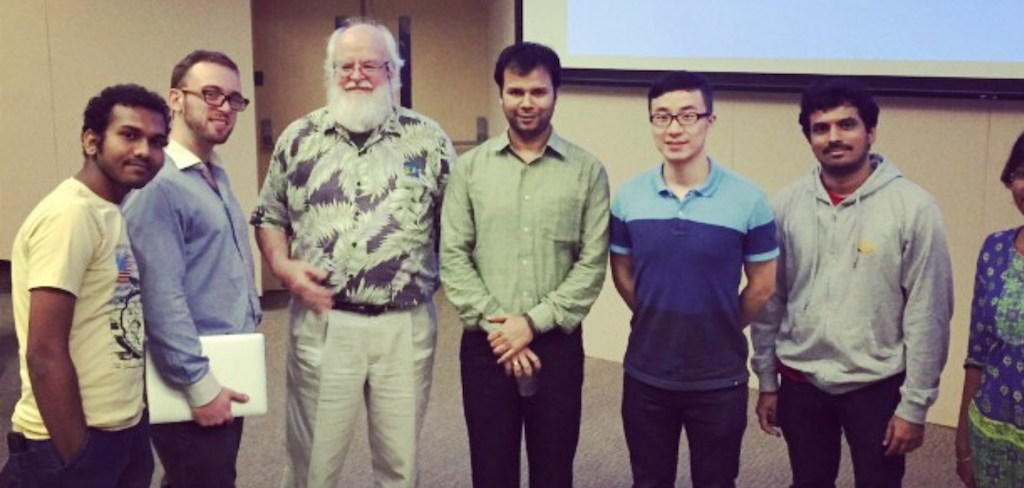
10 GOLDEN SKILLS FOR WORKING WITH US
Please note that we receive dozens of applications for internship, PhD, and staff hiring every month, which forces us to be rather selective. Before contacting us, please beware that we will expect you to:
1) be passionate about AI and affective computing
2) be willing to embrace new challenges with excitement, not fear
3) be aware of recent sentiment analysis literature
4) be rather independent in developing your own ideas
5) know how to write in LaTex (we do not use Word!)
6) know the basics of Python programming
7) have read the textbook Understanding Natural Language Understanding
8) have some basic knowledge of knowledge representation and reasoning
9) have some basic knowledge of deep learning
10) be willing to interact with the rest of the Sentic Team
